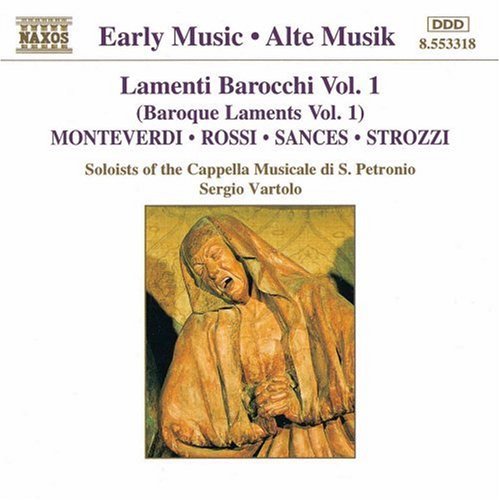Show results for
Deals
- 4K Ultra HD Sale
- Action Sale
- Alternative Rock Sale
- Anime sale
- Award Winners Sale
- Bear Family Sale
- Blu ray Sale
- Blues on Sale
- British Sale
- Classical Music Sale
- Comedy Music Sale
- Comedy Sale
- Country Sale
- Criterion Sale
- Electronic Music sale
- Fantasy Film and TV
- Folk Music Sale
- Hard Rock and Metal Sale
- Horror Sci fi Sale
- Jazz Sale
- Kids and Family Music sale
- Kids and Family Sale
- Metal Sale
- Music Video Sale
- Musicals on Sale
- Mystery Sale
- Naxos Label Sale
- Olive Films on Sale
- Page to Screen Sale
- Paramount Sale
- Pop and Power Pop
- Rap and Hip Hop Sale
- Reggae Sale
- Rock and Pop Sale
- Rock Legends
- Soul Music Sale
- TV Sale
- TV Sale
- Vinyl on Sale
- War Films and Westerns on Sale

Barocchi 1
- Format: CD
- Release Date: 10/24/1995

Barocchi 1
- Format: CD
- Release Date: 10/24/1995
- Composers: Barbara Strozzi, Claudio Monteverdi, Giovanni Felice Sances, Gregorian Chant, Luigi Rossi
- Conductors: Sergio Vartolo
- Performers: Antonio Abete, Cristina Miatello, Gloria Banditelli, Lucia Bagnoli, Maura Pederzoli, Michel van Goethem, Patrizia Vaccari
- Label: Naxos
- UPC: 730099431828
- Item #: NAX943182
- Genre: Classical
- Release Date: 10/24/1995

Product Notes
The Lamentations of the Prophet Jeremiah form part of the traditional liturgy in Holy Week, the texts of the Lessons of the First Nocturn on Maundy Thursday, Good Friday and Holy Saturday. Each verse begins with a Hebrew letter, preserved in the Latin liturgy, Aleph, Beth, Ghimel, Daleth and He, and words are added from the Prophet Hosea at the end of the verse. The chant for the Lamentations was established by the Council of Trent, the tonus lamentationum. The Lament itself has an ancient tradition as a literary and dramatic form, and hence as a musical entity. The most influential and effective of all Baroque musical laments was Monteverdi's Lamento d' Arianna (Lament of Ariadne), the only surviving part of his opera Arianna, with a libretto by Ottavio Rinuccini, written for and performed in Mantua in 1608, the year after Orfeo. Ariadne, daughter of King Minos of Crete, helps the Athenian Theseus escape from the labyrinth and the minotaur to which he and his companions were to be sacrificed. Sailing homeward, Theseus abandons Ariadne on the seemingly deserted island of Naxos, and her lament, given literary expression by Ovid, expresses her feelings at this desertion. It will be recalled that Ariadne subsequently found consolation with Bacchus and his followers, while the return to Athens I of Theseus was not without it's own untoward outcome, when a signal intended to assure his father of his safe return was mistaken, leading the father of Theseus to kill himself. Monteverdi arranged the Lament as a madrigal in 1614 and in 1640 restored it to it's original monodic form, this time with a Latin sacred text, including it in his volume of madrigals, Selva morale e spirituale. By this time the lament of Arianna had been much imitated.

